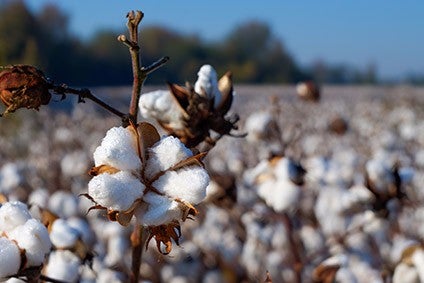
A senior figure in the US cotton industry has told just-style of his concern that Turkey’s collapsing currency and trade disputes with the US government will cause it to import less US-grown cotton.
The Turkish lira has dropped in value by 45% this year – indeed on 12 September last year, US$1 bought TRY3.43, but on the same date this year it bought TRY6.43. With inflation running at a crushing 101%, the currency is not likely to strengthen in exchange markets.
Turkey-US trade relations have worsened since US President Donald Trump in August announced that American import tariffs on Turkish steel and aluminium would be doubled.
The trade dispute is a classic example of Trump’s disregard for trade relation norms, and appears to have been inspired by Turkey’s detention of a Christian evangelical pastor, Andrew Brunson.
In response, the Turkish government, led by the equally pugnacious President Recep Tayyip Erdogan, has announced tariffs of up to 120% on American-made cars and has increased duties on several other American products, such as rice, makeup and alcoholic drinks.
See Also:
Potential impact
How well do you really know your competitors?
Access the most comprehensive Company Profiles on the market, powered by GlobalData. Save hours of research. Gain competitive edge.

Thank you!
Your download email will arrive shortly
Not ready to buy yet? Download a free sample
We are confident about the unique quality of our Company Profiles. However, we want you to make the most beneficial decision for your business, so we offer a free sample that you can download by submitting the below form
By GlobalDataDr Gary Adams, president and CEO of the National Cotton Council, is worried about the potential impact of the latest developments on the exports of US cotton to Turkey. “The large depreciation of the Turkish lira, increased inflation, and the escalating trade tension with the US could lead to reduced imports of US cotton in the 2018/19 marketing year”, he said.
Just how much this fall might be, he is not sure, “since it is still very early in the 2018/19 marketing year, and the impacts for US cotton are uncertain.” But even according to the latest US export data for the 2018/19 marketing year, which covers the 1 August 2018 to 31 July 2019 period, imports of US cotton are already (albeit slightly) below previous years.
“We are always concerned when there are trade tensions with a major customer of US cotton such as Turkey,” especially as Turkey has been an “important market for US cotton for many years.”
Indeed, since 2016, Turkey has been the third largest export customer of US cotton, behind China and Vietnam, according to data from the National Cotton Council. It states that Turkey today accounts for 12-13% of total US cotton exports.
And while Turkey also imports cotton from other countries including Greece, Brazil, Turkmenistan and Australia, US cotton exports to Turkey had been growing rapidly before coming to a halt this year. The figures show that in calendar year 2016, the US exported US$495m worth of cotton to Turkey. This grew by 47.5% to US$730m in 2017. Sales in the first six months of 2018 were US$563m.
In terms of volume, in the 2017/18 marketing year, which ended 31 July, Turkey imported almost 2 million bales of US cotton, with National Cotton Council data showing the US supplied half of Turkey’s total 2017/18 cotton imports of 4m bales.
Duty refund removed
Dr Adams noted that since 2015, Turkey’s imports of US cotton have faced a 3% tariff, while imports from other countries enter duty free. However, “before the latest trade tensions, a Turkish mill could receive a refund of the duty if the finished textile products were exported,” he added. “Once the trade tensions started, we understand that Turkey has removed the ability to receive the duty refund.”
He said the recent removal of this sales tax and customs duty exemption on imported cotton in Turkey “may also affect cotton imports in 2018.”
Could Turkey respond to the US actions by placing additional duties on imports of US cotton? “We have not received any indication that Turkey is considering an increase in the duty. However, we are encouraging the two governments to resolve the ongoing tensions,” said Dr Adams.
Inputs important for growth
Bilim Civan, a market entry consultant in Turkey, working for Alliance Experts, which provides sourcing consultancy to companies around the world, told just-style that she also believes the recent economic and trade difficulties will depress Turkey’s imports of US cotton – but that a solution to the dispute will be found to ensure American cotton supplies continue to feed Turkey’s textile sector.
Civan noted that these inputs are important for the continuing expansion of Turkey’s textile and clothing industry, complementing local supplies. “Turkey is the seventh-largest cotton producer in the world,” she said. “Cotton imports have also increased in recent years as cotton supply in the domestic market has increased and the government has taken steps to facilitate trade with imports.”
And while possible restrictions on US imports will encourage imports from other countries, “imports from the US will not stop.”
Civan stressed that the government recognises the importance of the textile and clothing sector to the Turkish economy, which the World Bank is still predicting will grow 4.5% this year, despite its problems.
“Therefore, the government will set up trade arrangements, to keep up the supply for the domestic market and textile exports. We do not expect that cotton from the US will be that much restricted that it will have a huge effect on the domestic supply.”
Currency concerns
She hoped the Turkish textile sector would be protected from the fall in the lira by government actions, including monetary policy and trade initiatives, but it would inevitably increase the cost of cotton supplies in lira for Turkish manufacturers, given they are priced in US dollars.
Dr Adams said the US cotton industry was worried about this, given the strength of the dollar. The only good news is that the lira is performing just as badly against weaker cotton exporting currencies, such as the Egyptian pound (EGP) – TRY1 bought EGP2.76 on 11 September and EGP5.14 on 12 September last year.
The lira is even weak against the currency of central Asian cotton exporter Uzbekistan, the Som (UZS) – TRY1 bought UZS1,222 this 11 September and UZS2,356 last 12 September. “The depreciation of the Turkish lira is not favourable to foreign imports since it makes imports more expensive,” stressed Dr Adams.







